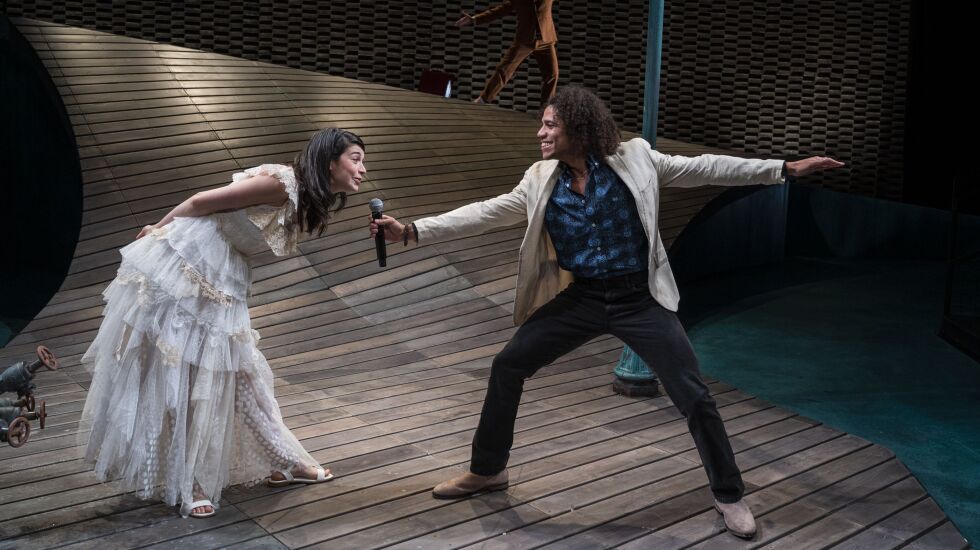
It may be best to avoid thinking of Sarah Ruhl’s 20-year-old work “Eurydice” — being revived at Writers Theatre in a visually exquisite production — as a play.
It is a play, because … well, because it is. But experiencing it feels far more like watching a poem and listening to a painting. Yes, I know, the matches of sense and form are off in that thought. It’s intended to capture a bit of how “Eurydice” comes across: You don’t always know what to make of it except that it’s gorgeous.
This is a dreamy, pixelated take on the Orpheus (Kenneth La’Ron Hamilton) and Eurydice (Sarah Price) myth. They marry, she dies, he uses his music to try to save her from the Underworld, it doesn’t work out. As the title suggests, it’s told from Eurydice’s perspective, although much of the time she herself doesn’t quite know what’s happening, a quality Price conveys with a wonderful mix of humble intelligence and the vulnerability of the spoiled.
“Eurydice” is an early work from Ruhl, who grew up in Wilmette and who went on to write more accessible, arguably more mature plays (plays proper!) like “The Clean House” and “In the Next Room, or the vibrator play,” both of which were finalists for the Pulitzer Prize. You can feel a young artist grappling with both form on the one hand — can I get to tragedy from comedy? how much needs to be said? — and mortality (and love) on the other.
This play, though, announced her gifts. It puts forth Ruhl’s wonderfully quirky and compelling voice: humorous and sad, carefully crafted yet fragile, reserved yet emotional, thematically rich yet more intuitive than analytical. The play has been produced widely and was even adapted by Ruhl and the composer Matthew Aucoin into an opera. (You can watch the Met production — directed by Mary Zimmerman, who knows something about adapting Greek myths — on PBS’ “Great Performances.”)
Maybe you should think of the play as a gentle opera with barely any music. In the play version, Orpheus mostly hears the music in his head, which frustrates Eurydice, who prefers books anyway.
This production represents the directing debut at Writers of Braden Abraham, the theater’s still-new artistic director, previously of Seattle Rep. This is a somewhat daring and auspicious start, laying down a marker that he’s willing to challenge a longtime audience with plays more abstract than the theater might have produced under its founder Michael Halberstam, who seemed drawn to more traditional, wordier, more logical pieces. There’s nothing wrong with either, and neither’s taste should be pigeonholed, but this show suggests that we might see more Samuel Beckett, less George Bernard Shaw.
To Abraham’s great credit, his production possesses a miraculous cohesion. The design work is genuinely superb down to small details, and the performers all very much inhabit the same strange, evocative world, where characters might try to read a letter with their feet.
Set designer Courtney O’Neill provides a precariously steep and sloping wooden stage; the shape itself is mesmerizing, and it captures the above and below we need for a story that is in part about the lands of the living and deceased. As fixtures, she adds just a lamp post and a hydrant, but she and lighting designer Marcus Doshi surely nail the elevator that rains inside. ‘Nuff said: It’s an image I won’t soon forget. And the just-plain-awesome costumes, from Danielle Nieves, blend this world’s whimsy with a mythic Americana inspired by cowboys and circuses, Jimmy Buffet and Jackie O.
Accompanying the superlative visuals, the performances have a special rare quality to them — a certainty, a purity, of being who and what they are. As Eurydice’s father, John Gregorio is just so very fatherly; as a creepy stranger and ridiculous Lord of the Underworld, Larry Yando is so compellingly creepy and powerfully ridiculous. Susaan Jamshidi, Elizabeth Ledo, and John Lister serve as a chorus to inject explanations of the laws of the post-life, but often with humor. They’re stones, you see, but dressed as beach bums, as if the forgetting that comes with death suggests a permanent vacation.
And to Price’s wonderful, contemplative, often down-to-Earth Eurydice, Kenneth La’Ron Hamilton counters ideally with an artistic Orpheus whose perpetual smile suggests an ethereal, innocent cluelessness.
Ruhl departs from the myth aplenty, a necessity to provide Eurydice with any agency. What shocks in the end is that a play — yes, a play — that can, through its 80-minute running time, seem to de-prioritize plot for the poetic, also can conclude with an emotional wallop only a great playwright could produce, and only a stone could ignore.







